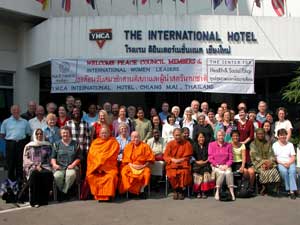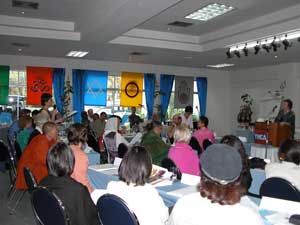The Chiang Mai Declaration
Religion and Women: An Agenda for Change
Note: This text was approved at the Peace Council's 2004 annual meeting in Chiang Mai, Thailand, which included a conference held jointly with leaders of international women's organizations invited by the Center for Health and Social Policy. A list of participants at the Chiang Mai meeting follows the text of the declaration. For more information on the meeting and links to related articles, see: Women, Globalization, and Religion. For a study guide and links to additional resources, see: The Chiang Mai Declaration: A Study Guide
 PREAMBLE:
PREAMBLE:
We, the participants in this conference on women and religion, recognize that contemporary realities have tragic consequences for women’s lives. Without a commitment to women’s human rights and to the resolution of these tragedies, religions are failing the world. Their own relevance is at stake as they become more and more isolated from the values and needs of their members.
It is urgent that religions address these realities. Religions must be consonant with the cultural evolution in which we are all immersed. Religions must no longer tolerate violence against women. Women are alienated from religions that do. We are committed to working towards change, and we call on others, women and men, to join in this task.
I. WOMEN AND GLOBALIZATION: PROBLEM AND PROMISE
We live in a time of rapid change which provides both challenges and opportunities. This change has profound effects on all our lives.
Our globalized world is ravaged by armed conflict, increasing economic disparity, the feminization of poverty, massive displacement of peoples, violence against women, the pandemic of HIV and AIDS, enduring racism, and extremisms – all of which generate a climate of deep fear and widespread insecurity.
Globalized capitalism has reduced everything to a commodity and everyone to a consumer and commodity. Nowhere is this more evident than in the lives of women:
• Women’s and children’s bodies are commodified, especially in sexual trafficking.
• Increasingly HIV and AIDS have a woman’s face.
• Women and children disproportionately populate the camps of refugees and displaced persons.
• Women make up the greater proportion of exploited laborers.
• Pressures of the globalized economy have led to even greater violence against women and children.
Globalization, however, also bears the promise and possibilities of advancing women’s human rights and well-being:
• More women in more places can be gainfully and justly employed.
• Information technology can enable women throughout the world to share strategies, successes, and hope.
II. WOMEN AND RELIGIONS: PROBLEM AND PROMISE:
Religions at their best celebrate the dignity of each human being and of all life as valuable parts of a sacred whole. They inspire and empower us to compassion and justice.
Religions, however, have not always been at their best. They have collaborated with dehumanizing values of cultural, economic and political powers. Thus they have contributed to the suffering of women:
• They have made women invisible by denying them religious education and excluding them from decision-making .
• They have been silent when patriarchal systems have legitimated the violence, abuse, and exploitation of women by men.
• This silence has been deafening in the face of such atrocities as rape, incest, female genital mutilation, sex selective abortion, and discrimination against sexual minorities.
• They have not recognized the conscience and moral agency of women, especially in relation to their sexuality and reproductive decisions.
But religions can and must do better. They must reclaim their core values of justice, dignity, and compassion and apply these values to women. We reached consensus that:
A. Within the religions, women’s religious literacy should be recognized and fostered. Women are:
• Students: Just as education of women is today understood to be critical in transforming the world, so providing women with religious education is critical in transforming religion. Women seek religious education at both basic and advanced levels. They should be welcomed.
• Scholars: In spite of obstacles, women have developed as religious scholars. That scholarship is an essential resource for the overall development of our understanding of religion. It should be promoted.
• Teachers: Male religious leaders and students have much to gain from exposure to women teachers of religion. Unless we work to change men, the ability of religions to progress in sensitivity to women is impossible.
• Leaders: Women should be full participants in the life and institutional leadership of their religious communities. Women are prepared to be decision-makers, and their gifts should be recognized and used to the fullest extent.
B. Within the world:
• Religions should apply their message of peace in order to oppose the daily reality of violence in family and society. There is a contradiction between the message of peace inherent in all religions and the absence of advocacy for peace in the home and society.
• Women are subjects, not objects, in their own lives. The right to choose any role, including motherhood, should be supported socially, economically, and politically.
• Religions should apply the message of social justice to women. The world’s religions play a leadership role in seeking social justice, in the environment, against racism, and for the poor. But religions have been largely silent in response to critical issues of women’s human rights, in the family and in the work place.
• This is nowhere more evident than in the area of women’s sexuality and reproductive health. Given the moral concern about abortion and the range of stances toward it, the view of any particular religious tradition should not be imposed on the consciences of others. Decriminalization of abortion is a minimal response to this reality and a reasonable means of protecting the life and health of women at risk.
 CONCLUSION:
CONCLUSION:
Our experience of coming together as women leaders and religious leaders has convinced us that the religious traditions and the aspirations of women are not in opposition. We are not enemies. On the contrary, we share the same commitment to human dignity, social justice, and human rights for all.
We therefore commit ourselves and call on other women and other religious leaders to reach out to each other to enhance mutual understanding, support, and cooperation. This can be done on the regional level to expand the consensus achieved here and at the national level to define concrete, joint activities toward advancing women’s human rights and well-being.
We came together as women and men to explore how the positive powers of religion could be engaged to advance the well-being of women. Indeed, we believe that when women and religious traditions collaborate, a powerful force for advancing women’s human rights and leadership will be created.
This statement was unanimously endorsed by all the participants on March 3, 2004.
PARTICIPANTS IN THE CHIANG MAI MEETING:
AFRICA
Rev. Rose Teteki Abbey
Presbyterian
Ghana
Pastor, Presbyterian Church of Ghana
Dr. Denise Ackerman
Anglican
South Africa
Extraordinary Professor, University of Stellenbosch
Dr. Hizkias Assefa
Ethiopia
Peace Council Trustee, and Professor, Conflict Studies, Eastern Mennonite University, and Coordinator, Africa Peacebuilding and Reconciliation Resources
Dr. Philomena Mwaura
Catholic
Kenya
Professor of Religion, Kenyatta University; Ecumenical Association of Third World Theologians
Mufuliat Fijabi
Muslim
Nigeria
Senior Programme Officer, Baobab for Women’s Human Rights
Aminata Toure
Muslim
Senegal
Technical Advisor on Gender, United Nations Population Fund (UNFPA)
ASIA
Zainah Anwar
Muslim
Malaysia
Executive Director, Sisters in Islam
Dr. Chung Hyun Kyung
Protestant
South Korea
Peace Councilor and Professor of Ecumenics and World Christianity, Union Theological Seminary (New York)
Ven. Dhammananda Bhikkhuni
Buddhist
Thailand
Peace Councilor and Buddhist Nun, Songdhammakalyani Temple
Samdech Preah Maha Ghosananda
Buddhist
Cambodia
Peace Councilor and Supreme Patriarch of Cambodian Buddhism and Co-founder of Inter-Religious Mission for Peace in Cambodia
Shamima Hasan
Muslim
Bangladesh
Program Manager, Gender and Women’s Empowerment, East, South East Asia and Oceania Region, International Planned Parenthood Federation (IPPF)
Irfan Ahmad Khan
Muslim
India
Peace Council Trustee and Founder, World Muslim Council for Interfaith Relations
Ouyporn Khuankaew
Buddhist
Thailand
Co-Founder and Director of the International Women's Partnership for Peace and Justice
Dr. Wilasinee Phiphitkhul
Buddhist
Thailand
Assistant Professor of Journalism, Chulalorngkorn University
Dr. Suwanna Satha-Anand
Buddhist
Thailand
Associate Professor of Philosophy, Chulalongkorn University
Dr. Vandana Shiva
Hindu
India
Director, Research Foundation for Science, Technology and National Resource Policy
LATIN AMERICA
Lydia Alpízar
Catholic
Costa Rica
Peace Council Trustee and Program Coordinator, Gender Rights Program, Association for Women’s Rights in Development (México City)
Alta Hooker
Moravian
Nicaragua
Rector, Universidad de las Regiones Autonomas de la Costa Caribe Nicaragüense (URRACAN)
Fr. Alberto Múnera
Catholic
Colombia
Rector Colegio San Bartolomé
Jacqueline Pitanguy
Brazil
Executive Director, CEPIA and the Civil Society Forum of the Americas
Silvina Ramos
Buddhist
Argentina
Executive Director, Center for the Study of State and Society
Teresa Valdés
Christian
Chile
Gender Area Coordinator, Latin American Social Sciences Faculty (FLACSO)
Fr. Gonzalo Bernabé Ituarte Verduzco, OP
Catholic
Mexico
Peace Council Trustee and Head, Dominican Mission to Ocosingo (Chiapas)
MIDDLE EAST
Dr. Saleha S. Mahmood-Abedin
Muslim
Saudi Arabia
Peace Councilor and Director of Academic Advancement & International Relations, Dar Al-Hekman College (Jeddah)
Leah Shakdiel
Jewish
Israel
Teacher, Be’er – Religious Women’s House of Study (Yeruham)
Rabbi Levi Weiman - Kelman
Jewish
Israel
Peace Councilor and Rabbi, Congregation Kehilat Kol Haneshama (Jerusalem)
EUROPE
Rev. Marcus Braybrooke
Anglican
United Kingdom
Peace Councilor and President, World Congress of Faiths
Roshan Dhunjibhoy
Buddhist
Germany
Executive Secretary, Women and Religion (Thailand)
Elfriede Harth
Catholic
France
European Representative, Catholics for a Free Choice and Coordinator, International Movement We Are Church
Ulla Margrethe Sandbaek
Denmark
Member of Parliament, The European Parliament
UNITED STATES
Sr. Joan Chittister, OSB
Catholic
United States
Peace Councilor and Executive Director, Benetvision
Dr. Joseph W. Elder
Quaker
United States
Peace Council Trustee and Professor of Sociology, Languages and Cultures of Asia, University of Wisconsin
Dr. Christine Gudorf
Catholic
United States
Professor of Comparative Religions, Miami International University
Rev. Debra W. Haffner
Unitarian Universalist
United States
Director, Religious Institute on Sexual Morality, Justice and Healing
Jim Kenney
Catholic
United States
Peace Council Trustee and Executive Director, Interreligious Engagement Project
Frances Kissling
Catholic
United States
President, Catholics for a Free Choice
Dr. Sallie B. King
Quaker
United States
Peace Council Trustee and Professor and Head of the Department of Philosophy and Religion, James Madison University
Dr. Paul Knitter
Catholic
United States
Peace Council Trustee and Professor Emeritus of Theology, Xavier University, Cincinnati, Ohio
Sr. Marcelline Koch, OP
Catholic
United States
Peace Council Advisor and Dominican Sister of Springfield, Illinois
Rev. Stephen Minnema
Presbyterian
United States
Peace Council Advisor and Pastor, Covenant Presbyterian Church, Madison, Wisconsin
John Udelhofen
United States
CPA, Chief Financial Officer Prefinished Millwork Corporation
SECRETARIAT
Peace Council
Dr. Daniel Gómez-Ibáñez
Executive Director, Peace Council Trustee, and Secretary of the Board of Trustees
F. Peter Brinkman
Associate Director and Peace Council Trustee
Sr. Mary Ellen Lewis
Assistant Director
The Center for Health & Social Policy
Stephen L. Isaacs
President
José Barzelatto
Vice-President
Axel Mundigo
Director of International Programs
Elizabeth Dawson
Director of Program Development
Home ||
About the Peace Council ||
Peace Councilors ||
Purpose and Commitments ||
Current Annual Report ||
Looking Ahead ||
News ||
Trustees ||
How You Can Help ||
Links ||
Contact ||
Page Published: 03/8/2004 · Page Last Modified: Thursday, December 6, 2007
©2004 International Committee for the Peace Council
